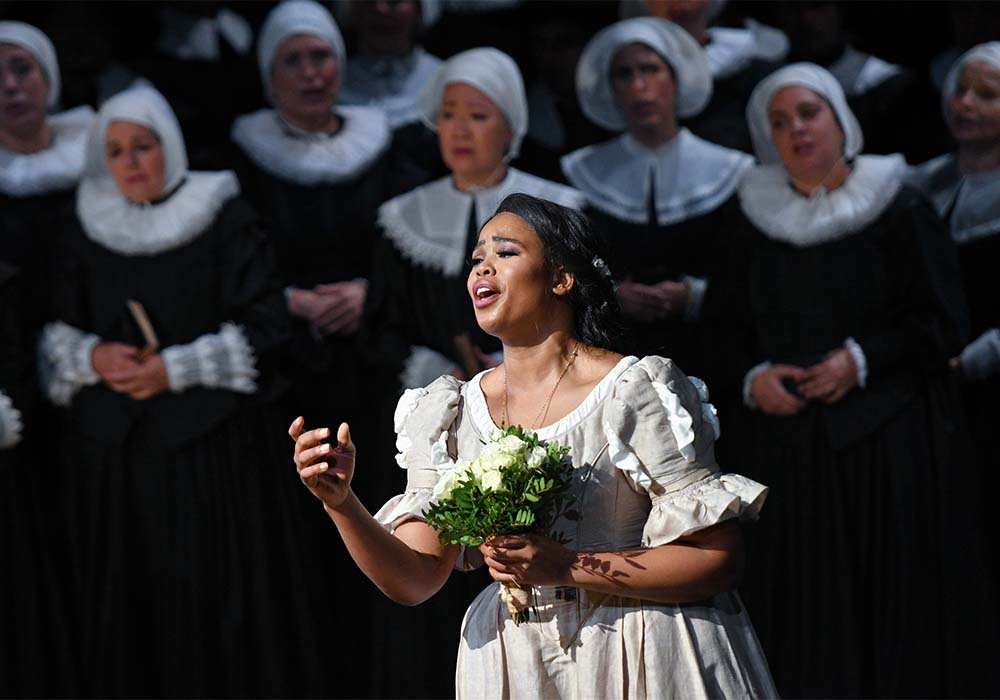[dropcap letter=”T”]
he opening of the 2018-2019 season at the Gran Teatre del Liceu, with the programming of I puritani by Vincenzo Bellini, is reaping a resounding success. The public, which is predisposed with the necessary memory to Montserrat Caballé -a brief speech and the audition of Casta diva, sung on the same stage-, is enthusiastic about the performance, bursting into applause even before the musical pieces are finished. The protagonist couple formed by Pretty Yende and Javier Camarena stands out, but with a special attention, inevitably, to the soprano: true soul of the performance, brings in veracity to a plot with few psychological nuances and an occasionally slow rhythm. She, alone, illuminates the scene. She, and the actress who accompanies her everywhere, exchanging the roles of participant of the action and of extemporaneous observer.
DISLOCATION AND UNFOLDINGS
The staging of Annilese Miskimmon is particularly brilliant in the unfolding of the conflict that the protagonist suffers in two moments of Western history (the religion wars in 17th Century and the armed clashes in Northern Ireland, during the seventies of 20th Century), different in scale but both unfortunately devastating. This temporary dislocation is complemented with a powerful scenic decision that we already enjoyed in the version of The Abduction from the Seraglio conducted by Lothar Zagrosek and -more important, in this sense- staged by Hans Neuenfels in the Staatsoper Stuttgart in 1998. In that Mozartian singspiel Neuenfels takes advantage of the hybrid character of the genre to unfold the main roles -a singer and an actor for each character- and create a wonderful mirror symmetry.
The dialogue that takes place inside the character unfolds through the song, whose effect is experienced just like any spectator by the actress, who represents the same role. By externalizing the consciousness of the one who sings, the other self of the character, the actor, receives the truth of his state of mind musically. And, also, the inverse phenomenon takes place: in an occasion of extreme anguish, for example, it is the actor -in this case actress- who demands music, in order to sublimate artistically intense affections, otherwise unbearable (“Sing!”, the Konstanze-actress will shout actress at the soprano-Konstanze, to make her understand herself). Konstanze is harassed by a powerful pasha, Bassa Selim, who at the end of the plot will appear understanding and magnanimous, making possible the love of the protagonist couple. He explains it to him in that aria (“Ach Ich liebte, war so glücklich”) that begins with a note of the oboe -loving instrument par excellence- held in the air for more than fifteen seconds.
The beginning is slow (adagio) and the fragility of the character manifests, but as it happens with so many feminine characters in Mozart’s operas, Konstanze will become strong progressively in that same aria until the final allegro, thanks to the degree of consciousness that the song provides -the second aria of The Countess (“Dove sono i bei momenti?“) in Le Nozze di Figaro is another example of this procedure- resulting in a virtuous self-affirmation of her position in the world, facing the possibility of a lost love. The degree of psychological realism of the three most lucid Mozartian operas (Nozze, Cosí and Don Giovanni) is largely due to the astuteness of the librettist Lorenzo da Ponte, whose skill is lacking in some of the Bel Canto dramas, namely I puritani, opera for which Bellini could not count on the good arts of his habitual Felice Romani, “prince of the librettists”.

IMPOSSIBLE AND TRUE LOVES
If, in spite of everything, its premiere in Paris, in 1835, was a success -as it is also in the Liceu, in our nearest present- it is due to the vocal treatment of the protagonist couple, plunged into a drama without possible solution of continuity. In fact, Miskimmon skillfully tries a solution… which is not such, resulting in an excellent depiction of the tragic essence of history. As we said, she splits in two different moments the plot and the female characters: an actress dressed in the Elvira s. XVII accompanies the soprano when the character lives in the twentieth century and vice versa, the actress dresses in the fashion of the seventies when she watches over the misfortunes of the Elvira affected by the wars between Catholics and Protestants. All this to confirm the topical love known since troubadour poetry, especially successful in its modern version, during romanticism: that the reality of true love lies precisely in its unattainable character. The horizontal distance with the beloved -the physical remoteness- results in the ontological repetition of the confrontation between clans, in the most genuinely Shakespearean sense, which is perpetuated beyond time.
“When they told me that it was humanly possible to sing like that, I did not stop until I was part of that extraordinary art, an art that expresses the power of music through the most exceptional instrument of all: the voice”
 But let’s listen to Pretty Yende, she knows better than anyone what it running through the veins of an Elvira completely in love and out of herself, being abandoned by her beloved in the most incomprehensible way: she is “a young woman determined by what she believes in (…) Bellini wrote her music in a way that shows all the skills and vulnerabilities that lead her towards her psychological escape”. In fact, because of the inadequacy of her love, she remains in a kind of no-man’s land: she loses her mind, unable to return to being who she was or happily display what her encounter with Arturo has awakened. She can neither return to the clan to which she belongs nor be united with the other that is desired and that is not, because he is no longer there. On the one hand, that ensures a form of eternal love, beyond any limiting circumstance; on the other, that kind of love can only exist in the least reasonable and adequate way, since the fuel that feeds it is absence (absence of response, of real interlocution). Hence, when the reunion with the beloved takes place, in the third act, nothing can be the same again.
But let’s listen to Pretty Yende, she knows better than anyone what it running through the veins of an Elvira completely in love and out of herself, being abandoned by her beloved in the most incomprehensible way: she is “a young woman determined by what she believes in (…) Bellini wrote her music in a way that shows all the skills and vulnerabilities that lead her towards her psychological escape”. In fact, because of the inadequacy of her love, she remains in a kind of no-man’s land: she loses her mind, unable to return to being who she was or happily display what her encounter with Arturo has awakened. She can neither return to the clan to which she belongs nor be united with the other that is desired and that is not, because he is no longer there. On the one hand, that ensures a form of eternal love, beyond any limiting circumstance; on the other, that kind of love can only exist in the least reasonable and adequate way, since the fuel that feeds it is absence (absence of response, of real interlocution). Hence, when the reunion with the beloved takes place, in the third act, nothing can be the same again.
THE GIFT OF SINGING
Elvira’s passion is completely musical, confronted inclusively with the abyss of her disorder. Her interventions express through musical writing (and not so much the words) that fullness and also its anguished reverse, enlightning the topic that says that music manages to transfer affects, what the soul enjoys or suffers, in a more intense and truthful words. A similar conviction was experienced by young Pretty Yende, falling in love with the musical medium, when she discovered the Duo des fleurs by Léo Delibes: “I experienced a supernatural sensation, something that sounded familiar to me in my heart” (…). “When they told me that it was humanly possible to sing like that, I did not stop until I was part of that extraordinary art, an art that expresses the power of music through the most exceptional instrument of all: the voice”. In this sense, the celebration of his name could not be more eloquent and happier. The adequation with oneself -the absolute correspondence between will and feeling- repairs every possibility of split, and can be shared with the public, making us believe in that power of music:
The vital fullness that emanates from the singing -recognition of the affect that one feels and communicates effectively, in glorious feedback- is unequivocal in the case of Pretty Yende; so evident that no one at the Gran Teatre del Liceu did not perceive her degree of commitment and faith in the truth of her art, beyond religions and confrontations. The South African soprano, who in I puritani updates the Shakespearian drama par excellence -very much remembered this year for the version that Bernstein would later make, West Side Story– has said that singing “is a gift for humanity, so universal and, however, so personal and intimate”. And her performance at the Liceu, at the opening of the season, moves for the authenticity of her love for musical art. Not only conceived as mere amusement or aesthetic recreation, but, in line with what experienced by the Mozartian heroines: assumed vitally as a suitable means to exorcise inner demons and self-assert against the stigmatization of the group.
A CONSTITUTIVE SPLIT
More than psychological nuances -as we said, before- Bellini’s opera chooses to press infallible keys during Romanticism, keys that for reasons difficult to specify (with few words, at least) still the general public tends to assume. It seems undeniable that the ancient tragedy, in any case, is transformed with the emancipation of subjectivity in the modern times. Must me highlighted the new function of the choir, representative of the group, the supposedly homogeneous faction: more than accompanying the hero from a distance and promoting emotions, empathy or catharsis in the spectator, it now works as an unstable support, as a narrator or unreliable voice-over -evident, for example, in several films by Lars von Trier– that in a rather subtle way stings the subject with the need to position himself and act on his own.
The modern drama lies precisely in the constitutive inadequacy of the individual, who recognizes himself unique from an emotionally inalienable experience: in the same way that the experience of the self assures that he is, it insinuates with authoritarianism that he can no longer really join the mass.
The modern drama lies precisely in the constitutive inadequacy of the individual, who recognizes himself unique from an emotionally inalienable experience: in the same way that the experience of the self assures that he is, it insinuates with authoritarianism that he can no longer really join the mass, the faction, without ceasing to be the one that feels being. And, nevertheless, an opposed temptation pervives, very anthropologically understandable: the will to become strong with the group, as an unbreakable and essential entity. A temptation that we suspect no less mythical and unrealizable than the complete emancipation of the subject from nature. Undoubtedly, heroes are those who face the split artistically.





















